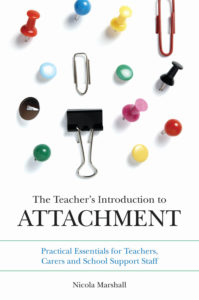 In this article, Nicola Marshall, author of The Teacher’s Introduction to Attachment, reflects upon the role schools play in supporting children with attachment issues, and how they can improve their education experience.
In this article, Nicola Marshall, author of The Teacher’s Introduction to Attachment, reflects upon the role schools play in supporting children with attachment issues, and how they can improve their education experience.
It’s Mental Health Awareness Week at the moment with a focus on relationships, so I thought I’d use this theme as an opportunity to talk about children with attachment issues, and how schools can improve the level of emotional support they receive.
As an adoptive parent who runs a practice training teachers on attachment and why it matters, I have gained many years of insight into the highly pressured, results-driven environment that our education system increasingly imposes upon our schools today.
I’m very aware that for ‘typical’ children who have the love and support of at least one of their parents, school and the pressures of grades and exams can be overwhelming too. But for children with attachment difficulties, the expectancy to perform well in school only compounds the numerous emotional problems that they are already facing.
Children with attachment issues find it hard to trust. Infants who do not have their needs consistently met by their parents are reluctant to rely on others as they grow up. Instead, they will look to meet their needs themselves without asking for help. This can lead to a child having difficulties in making and sustaining friendships, whilst those around them struggle to relate to the fiercely self-reliant image that they may give off. They may also feel a sense of shame about their pasts; if they’ve been consistently told, for instance, that they are stupid and a waste of space by an abusive parent, why would they be willing to assert themselves academically? Their memory and organisational skills are also less likely to be developed, as they are instead used to living in the fight, flight or freeze part of the brain that is wired for survival. Together these emotional problems help to explain why children with attachment difficulties are ten times more likely to be excluded from school, and four times less likely to go on to further education.
So how can school become a place where children with attachment issues do not feel so out of place? How can school support these children, instead of making them feel yet more alienated? After all, our time at school is supposed to be an experience that, as adults, we look back on happily.
It is important to understand that, for these children, school is more about survival. It is about seeing the day through. It is not about learning and getting top marks. So it is essential that schools respond to their emotional needs first before they begin to think about imposing any academic targets upon them. Instead of pushing these children to achieve in ways they find impossible at the moment, we need to be understanding their mental health needs, meeting those needs, and not letting exam grades convolute this process. Schools must act as consistent, regular and reliable points of contact for children with attachment difficulties. They must serve as a constructive place where trust between themselves and the adults who support them is forged, and not as a place where they are going to be closely scrutinised and compared to other children. And, if a child who is struggling with attachment does act out or misbehave, do not be so eager to tell them off in a shameful way as you might do to other kids, as this can stall the progress of the relationship you are trying to build with them by making them feel less safe. And, lastly, communicate frequently with their adopters and carers in order to create as transparent and comprehensive a picture as possible about what exactly is going on in their lives. To borrow a quote from the eminent educator and historian Nicholas Ferroni : ‘Children who are loved at home come to school to learn, children who aren’t come to school to be loved’.
The Teacher’s Introduction to Attachment is an easy to read, easy to use introduction for teachers and school support staff which gives practical advice on how to help children with attachment difficulties in school. Nicola has recently created a workbook with additional content and space for notes to accompany her book. To find out more about the workbook, please click here.
“School is about survival” – yes, they will not do well unless their emotional needs are met first and they feel safe! Otherwise, their nervous system will be so activated, they won’t hear or retain a thing! Your post also reminds me of why I often work with parents of children with attachment disorder to take their children out of school for even a short time will they work on the attachment and helping their children feel safer with relationships! Even still, the principles you discuss here can be applied to all children – not just adoptive. Like you say, school needs to be a felt emotionally safe place for any child to perform well in school!